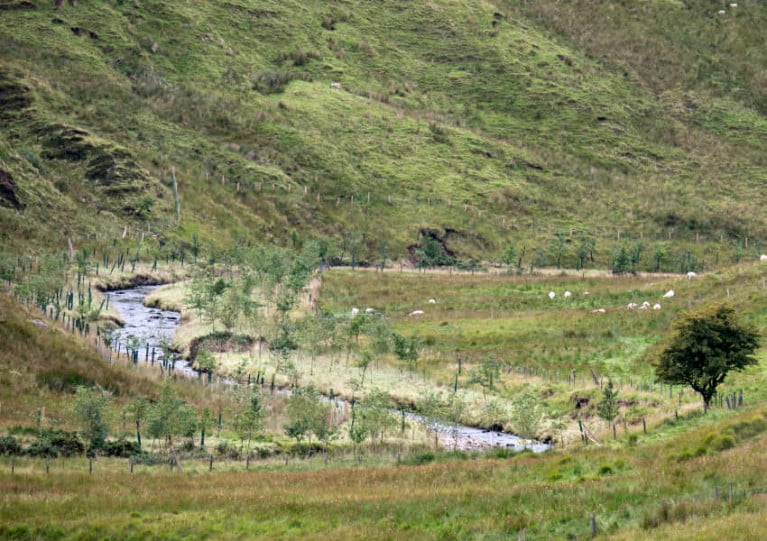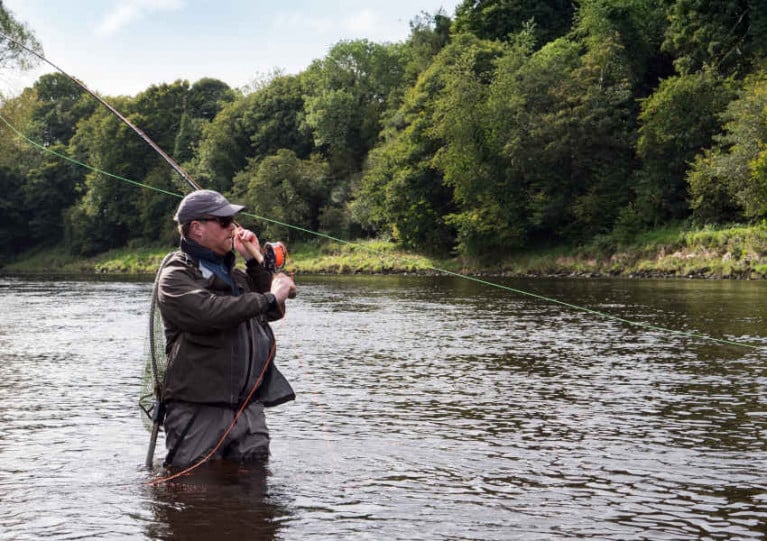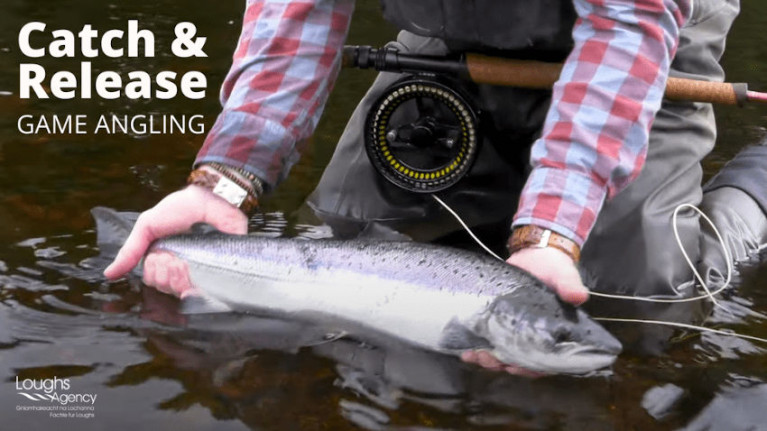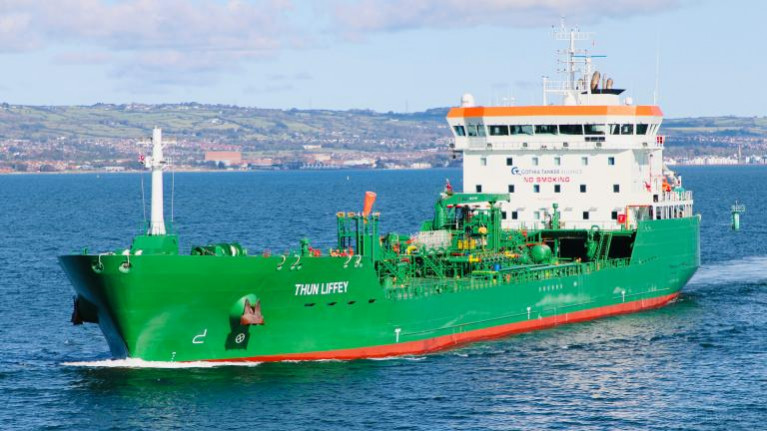Displaying items by tag: foyle
Loughs Agency Launches Public Consultation for Angling and Fisheries Improvement in Foyle and Carlingford
A public consultation on the Loughs Agency’s angling and fisheries improvement strategy and action plans for Foyle and Carlingford has been launched.
The consultation, which will run for a period of eight weeks, will provide members of the public with the opportunity to share their thoughts on the agency’s plans for improving angling and fisheries products in these catchment areas.
Three informative, data-led documents have been drafted by the Loughs Agency, which aim to provide a baseline for how best to implement changes that will have a real and lasting impact on angling and fisheries in the coming years.
These documents are the Fisheries and Angling Improvement Strategy for Foyle and Carlingford 2022-2030; Angling Action Plan for Foyle and Carlingford 2022-2030; and Fisheries Improvement Action Plan for Foyle and Carlingford 2022-2030.
A stakeholder consultation process was held in late 2022, which provided angling clubs and members of the angling community with an early chance to have their say. This feedback has since been incorporated into the latest drafts.
Loughs Agency will be holding a series of information sessions throughout the catchment areas in April. Agency staff will be present at these to answer questions on the documents, while also assisting with the feedback process. The sessions will take place as follows:
- Loughs Agency HQ, Prehen, Monday 17 April from 6pm-9pm
- Mellon Country Inn, Omagh, Tuesday 18 April from 6pm-9pm
- Jackson’s Hotel, Ballybofey, Monday 24 April from 6pm-9pm
- Canal Court Hotel, Newry, Tuesday 25 April from 6pm-9pm
Alternatively, those interested in having their say on these strategy documents can do so in their own time by completing the survey which can be found on Loughs Agency’s website.
Sharon McMahon, Loughs Agency chief executive said: “This public consultation will allow us to ensure all views are taken into consideration as we aim to deliver an outcome-orientated approach to fisheries and angling improvement.
“The feedback obtained from this process will help in the development of a clear strategic pathway, ensuring that these resources are improved for all.
“I would like to thank the agency staff who have contributed to developing these documents with a focus on knowledge, stewardship and sustainability. This work will help in the delivery of meaningful changes to fisheries and angling in Foyle and Carlingford.”
The draft documents as well as a link to the survey can also be found on the Consultations section of the Loughs Agency website.
The Loughs Agency has issued a declaration suspending netting in the River Foyle, Lough Foyle and seaward of Lough Foyle and restricting angling in the River Finn to catch-and-release only.
The restrictions have been put in place to protect the Atlantic salmon, the agence says.
It explains that the number of salmon which have migrated upstream of the River Finn fish counter during each of the previous five years has not exceeded 5,410 as stipulated in the Foyle Area (Control of Fishing) Regulations, 2010.
A copy of the full declaration can be viewed in Irish and English.
'Water Warriors' Education Events Held at Foyle and Carlingford
Loughs Agency’s 'Water Warriors' events took place this week in the Foyle and Carlingford catchment areas.
The events, which form part of the Agency’s Foyle & Carlingford Ambassador Programmes, attracted hundreds of post-primary pupils to partake in a 'fully immersive' educational experience, emphasising learning about the importance of conserving and protecting our natural environments and aquatic life.
Angela Dobbins, Deputy Mayor of Derry City and Strabane District Council, also visited the Foyle event.
Approximately 600 attended the Foyle event on 22nd November at the Millennium Forum, Derry, with pupils attending from the following schools:
- Foyle College, Derry
- St Joseph’s Boys’ School, Derry
- Thornhill College, Derry
- Oakgrove Integrated College, Derry
- St Columb’s College, Derry
- Gaelcholáiste Doire
- St Cecilia’s College, Derry
- Ardnashee School, Derry
- Strabane Academy
- Knockavoe School, Strabane
- Omagh Academy
- Drumragh Integrated College, Omagh
- Carndonagh Community School
- Limavady High School
- Dean Maguirc College, Carrickmore
The Loughs Agency has confirmed the detection of a “limited number” of escaped rainbow trout from an aquaculture facility in the Foyle area.
Investigations are being conducted by inland fisheries officials from Northern Ireland’s Department of Agriculture, Environment and Rural Affairs (DAERA).
Anglers in the area who catch rainbow trout are advised not to release them back into the river and, if possible, to retain samples for Loughs Agency fishery officers who will collect them on request at +44 (0) 28 71 342100.
No Derry Boat but Clipper Round the World Race is Heading for Foyle Maritime Festival in July
You can always be sure Derry will put on a good show, whether it be a Jazz Festival, Halloween or a Light Show. And this year will be no exception when the City hosts the Clipper Race stopover in July during the Maritime Festival.
The news about the official return of the Clipper 2019-20 Round the World Yacht Race recently announced by Derry City and Strabane District Council was greeted with excitement and optimism when the dates for the Foyle Maritime Festival were confirmed as July 20-24. This will be the fifth consecutive time that the City of Derry has acted as a host port and the crews will once again enjoy a fabulous welcome to the Foyle
The race resumed on Sunday 20th March from Subic Bay in the Philippines after a two-year delay due to the pandemic. Race crew from 21 different countries are currently taking part in the first point-scoring race, which will take the fleet across the North Pacific Ocean.
Mayor of Derry and Strabane, Alderman Graham Warke said he was delighted at the news, and the much-anticipated return of the sailing fleet to the Foyle, where they will take centre stage at the Maritime Festival. "This is fantastic news; we are thrilled to be able to confirm that the Clipper Race Crew will be arriving in the City on time to join us for the Foyle Maritime Festival. There will be so much excitement as the first yachts appear on the Foyle. It will mark a real milestone in the journey of the crew but also very significantly in terms of the slow journey towards recovery that we have all been on”.
 Foyle Maritime Festival
Foyle Maritime Festival
The festival draws hundreds of visitors including many who come by boat to the city centre marina where crews enjoy being in the midst of the festivities.
Highlights of this year's event include the Legenderry Street Food Festival, live music events, on-street animation, marine-themed installations, and much more still to be confirmed as the final touches are put to the programme.
Head of Culture with Council, Aeidin McCarter, said that excitement was already building ahead of the event. "There's a great sense of anticipation about the Foyle Maritime Festival, it's the flagship summer event for the City and District, and one that always generates an incredible buzz of excitement many months before the first sails are sighted on the Foyle”. She continued, “We are delighted that the Clipper Race fleet will once again be central to our festivities, with all the colour and comradery that the crew bring to the Quayside”.
Mark Light, Clipper Race Director is no stranger to the Foyle. He skippered the inaugural Derry-Londonderry team in the 2011-12 edition, the race start of which is still one of his favourite memories. He said “ This has been the longest Clipper Race edition in our history and so we are looking forward to returning to this wonderful city more than ever. As a Skipper who has previously had the honour of representing Derry-Londonderry I have experienced first-hand the exceptional welcome our teams always receive from locals. And for our fleet to be the centre point of the Foyle Maritime Festival is a real honour. We can't wait to be back!"
The fleet is expected to arrive in Derry around 16th July after the 3000nm Race 14 from New York to the Foyle which is estimated to take approximately 15 -19 days.
Chairman of Clipper Events, Sir Robin Knox-Johnston said: “This will have been the longest edition in our 25-year history. We appreciate it has been a long wait for our crew competing in the outstanding stages of this circumnavigation, but we can’t wait to get our teams racing again and continuing the Clipper 2019-20 Race.”
City of Derry doesn’t have a boat in this race but nevertheless has a considerable international following for the event built up over the years. This year the theme is 'What Lies Beneath' focusing on the natural beauty of our oceans, rivers and lakes, and the onus on all of us to protect and preserve marine life.
Call for Updated Catch Returns as Game Angling Season Closes in Foyle and Carlingford
The Loughs Agency reminds anglers of the annual close season, which prohibits angling over the winter months to help protect salmon and sea trout from disturbance when spawning.
The Foyle Area and Carlingford Area (Close Seasons for Angling) Regulations prohibit fishing for salmon and sea trout over the winter, with fishing due to resume in early 2022.
The annual close season for salmon and sea trout began last Thursday 21 October in the Foyle catchment, and starts Monday 1 November in the Carlingford catchment.
As closing dates vary slightly across the catchments, Loughs Agency encourages anglers to check season dates for each river on the Loughs Agency website and social media platforms, as well as with fishery owners to ensure they are up to date on local restrictions.
The State of the Salmon report published recently by the international lead on salmon management, the North Atlantic Salmon Conservation Organization (NASCO), highlights the worrying and continuous decline in the populations of the Atlantic salmon.
NASCO states: “It now takes about double the number of eggs to produce one adult (compared to 1990s) that will return to that same river to spawn – an indication of the multiple pressures facing the species throughout its complex life cycle.”
Lough Agency chief executive Sharon McMahon said: “The annual close season is an important time of year. Reducing disturbances on fish when they are spawning and at their most vulnerable helps protect stocks for the future.
“We recognise that angling is not the sole cause of stock decline, but by observing the close season, anglers are ‘playing their part’ in boosting the long-term resilience and sustainability of iconic fish species.”
John McCartney, director of conservation and protection at the Loughs Agency, added: “We all must take a forward-thinking approach based on the latest scientific guidance that balances responsible angling and sustainability.”
As the game fishing season ends for 2021, anglers are reminded to update their catch return and fishing effort on the Loughs Agency elicence website.
Anglers who wish to fish during the winter months are permitted to catch coarse fish such as perch, roach and bream, for which a valid coarse fishing licence is required.
During the close season, Loughs Agency fishery officers patrol riverbanks to prevent illegal fishing and protect fisheries. Anglers found fishing out of season will be prosecuted through the courts.
The Loughs Agency encourages members of the public to make direct and prompt illegal fishing reports either through the 24-hour response line at +44 28 7134 2100 or through the WaterWatch reporting tool.
Loughs Agency Invests £80k in River Roe Enhancement Projects
Over £80,000 has been invested in habitat enhancement projects in the River Roe catchment area in Co Derry during the past two years, the Loughs Agency says.
More than 20 sites within the Roe catchment were prioritised by the agency as a result of an assessment process conducted with habitat surveys and local angling club engagement.
Investment since 2019 included installing 6,500m of riparian fencing along the Bovevagh, Castle, Lynn, Owenbeg and Woodburn rivers and adjacent to the main River Roe itself.
Native trees planted previously to increase tree cover in the Roe’s upper reaches have been pruned to encourage growth, and around 4,000 tree guards were removed.
Instream works were also completed in the headwaters to ensure suitable spawning habitat for salmonids.
This is regarded as an area of special scientific interest (ASSI) because of the river’s physical features and its associated riverine flora and fauna. It is noted in particular for the population of Atlantic salmon, which is of international importance.
Riparian fencing, tree planting and associated works will improve water quality with increased bank stability and reduced erosion risk, the Loughs Agency says.
‘At a time when our rivers generally are under threat, this work will hopefully prove its worth in the years ahead and help sustain this valuable resource’
Biodiversity support, protection of invertebrates and indigenous fish populations in the River Roe and its tributaries are all key features of ongoing river restoration in the catchment area, it adds.
Roly Wysner, fishery inspector at the Loughs Agency, said: “The positive engagement between Loughs Agency and landowners cannot be understated.
“We worked with landowners who were very willing to participate and understood the rationale for the installations. They appreciated how it would feed into achieving sustainable management of both the riparian and aquatic habitats.”
Local club Roe Angling Ltd also welcomed the projects. A spokesperson said: “At a time when our rivers generally are under threat from a number of sources, this work by Loughs Agency will hopefully prove its worth in the years ahead and help sustain this valuable resource.
“The success of this programme is also indicative of the positive relationship that exists between Loughs Agency and landowners.”
The Loughs Agency’s Habitat Improvement Strategy outlines works associated with conserving, protecting, and improving the abundance and distribution of wild salmon and trout in Foyle and Carlingford’s freshwater catchments.
For more information on Loughs Agency’s habitat enhancement work or to read the full case study for the Roe catchment, visit the habitat section of the Loughs Agency website.
While some anglers enjoyed success on the rivers within Foyle and Carlingford in 2020, the Loughs Agency says it continues to take a precautionary approach in line with national and international trends.
The State of the Salmon Report published by the international lead on salmon management, the North Atlantic Salmon Conservation Organization (NASCO), highlights the worrying and continuous decline in the populations of the Atlantic salmon.
NASCO states: “It now takes about double the amount of eggs to produce one adult (compared to 1990s) that will return to that same river to spawn — an indication of the multiple pressures facing the species throughout its complex life cycle.”
This decline continues to be reflected locally, the Loughs Agency warns, with rivers such as the Finn in Co Donegal failing to reach their conservation targets in 2020 and therefore will continue to operate on a catch and release basis for the 2021 season.
Now the agency is calling on anglers to take steps to ensure sustainability of the fisheries of Foyle and Carlingford. Anglers are encouraged to:
- Update their catch return and fishing effort regularly throughout the season on the eLicence website. This data is used to help Loughs Agency manage the fishery using real-time data.
- Keep the Loughs Agency’s 24hr Response Line telephone number +(0) 44 2871 342100 as a contact on their phone and report any concerns directly and promptly. The Loughs Agency relies on reports of illegal fishing and pollution from the public.
- Practice catch and release. Many anglers already do this, with around 45% of anglers not taking carcass tags when they purchase their licence.
- Implement biosecurity measures to prevent the spread of invasive species.
- For the 2021 season, the Loughs Agency is issuing a maximum of one blue tag for the period 1 March to 31 May and/or a maximum two black tags for the period 1 June to 31 October, depending on the type of licence purchased. Tackle shops have been instructed not to issue more than these maximum quantities for the 2021 season.
The rivers Film and Foyle opened this past Monday 1 March, signalling the start of the salmon, sea trout and wild brown trout angling season. However, game, coarse and sea angling is already available in both catchments.
For still water game anglers, Binevenagh Lake opened on 1 February. The lake lies on a basalt plateau that towers over Lough Foyle and its flanking lowlands below with the famed hills of Donegal beyond.
The 3.2 hectare lake is regularly stocked with rainbow trout by DAERA Inland Fisheries and successful flies include Bibio and Buzzer patterns.
Fly fishing, spinning and worm fishing are permitted and the fishery has a daily bag limit of four trout per rod. A Loughs Agency game rod licence and a DAERA game angling permit are required to fish this water.
Some private fisheries are also operating and offer fishing for rainbow trout including Ballyheather, Altmore, Birchwood, Cashel, Termon, Oaks, Glenowen, and Duncrun Fishery in the Foyle area. In the Carlingford area, Donaghaguy Reservoir is open for trout fishing. A Loughs Agency game licence and a permit from the relevant fishery are required to fish these waters.
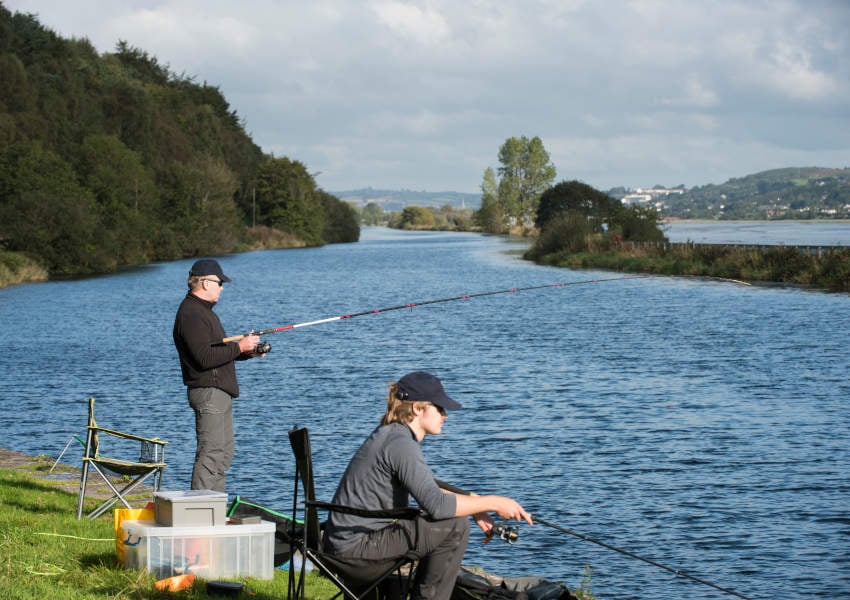 Coarse angling on the Newry Canal | Photo: Loughs Agency
Coarse angling on the Newry Canal | Photo: Loughs Agency
Coarse angling is permitted all year round, but the climate impacts on which species can be targeted. While tench, bream and rudd are active in warmer weather, roach and perch feed in all seasons and make good year round fishing for the coarse angler.
In the Foyle area, coarse fishing is currently available at Aghlisk Lough, Baronscourt Lakes, Enagh Lough, Longvale and Lough Muck near Omagh. In Carlingford, anglers can also fish for roach and perch at Bessbrook, Camlough, Derryleckagh, Drumlough, Greenan Lough, Mill Dam, Milltown Lough and in Newry Canal. A Loughs Agency coarse licence and permission from the relevant fishery owner is required to fish these lakes. In some cases a day ticket must be purchased.
The marine waters in Foyle and Carlingford offer fantastic sea angling with stunning landscapes and seascape backdrops. Flounder, bass, dogfish, dab, rockling, conger, pollock and ray are likely catches for the shore angler.
The Foyle area has over 90 miles of coastline of inlets, beaches, estuaries and rocky shores from which to cast from, while Carlingford offers almost 30 miles of coastline opportunities to fish. No licence is required for sea angling, but if fishing for salmon or sea trout a Loughs Agency game licence is required for the season.
Anglers are reminded to comply with the latest government advice and restrictions to stop the spread of COVID-19. For further information on season dates, licence and permit requirements in the Foyle and Carlingford areas, visit the Loughs Agency website’s angling section HERE.
Loughs Agency Renews Appeal for Anglers to ‘Catch & Release’
The Loughs Agency has launched a new campaign appealing for angling enthusiasts to embrace the practice of catch and release to help sustain fish stocks in the Foyle and Carlingford areas.
The agency says it welcomes the growing trend of catch and release angling as a way of continuing to fish while limiting the impact on local stocks.
And it has produced a video guide to help anglers with their catch and release technique in order to increase the survival rate of salmon after release.
John McCartney, the agency’s director of conservation and protection, also explains the carcass tagging scheme which applies to salmon, brown trout and sea trout retained by recreational anglers, and highlighted the importance of returning any unused tags.
The Loughs Agency is aiming for a catch and release rate of over 80% for salmon and sea trout caught during the new season which is now partially underway.
It also wants to further reduce the number of anglers opting to take tags when purchasing a licence.
‘The agency welcomes this approach to angling and would encourage all anglers to practice this method’
McCartney says: “Last year, 45% of anglers purchasing a licence opted not to take tags and there is a growing trend of anglers implementing the practice of catch and release.
“The agency welcomes this approach to angling and would encourage all anglers to practice this method as a way of continuing to fish, whilst limiting the impact on local stocks.
“Numbered tags are allocated to anglers who request them when they purchase their licence. The angler then records their retained catch and the corresponding carcass tag number when updating their catch return during the fishing season, returning any unused tags to Loughs Agency when their licence expires.
“The catch return data from anglers is analysed throughout the season and used to make fishery management decisions to ensure the sustainability of species in Foyle and Carlingford.”
For the 2021 season, the Loughs Agency is issuing a maximum of one blue tag for the period from 1 March to 31 May and/or a maximum of two black tags for the period from 1 June to 31 October, depending on the type of licence purchased. Tackle shops have been instructed not to issue more than these maximum quantities for the 2021 season.
The above video guide to good practice for anglers with their catch and release technique includes the following pointers:
- Landing the fish quickly to avoid exhausting the fish.
- Use a soft knotless mesh net and keep the fish in the water at all times.
- If you must handle the fish, use wet hands and cradle it below the belly. Never put your fingers inside the gill covers or lift the fish by the tail.
- Use a single barbless hook to limit injury during removal. Remove the hook immediately, keeping the fish in the water.
- If the hook is caught deep in the fish, cut the line and release with hook still inside rather than trying to remove deep-caught hook.
- When releasing the fish, support it in the water using two hands, with the head pointing upstream to aid breathing.
The season has already started on some still-water fisheries, with fishing on the rivers beginning to open up from Monday 1 March.
For further information on season dates, licence and permit requirements in the Foyle and Carlingford areas, visit the angling section of the Loughs Agency website.
Efforts Underway to Refloat New Tanker Aground in Lough Foyle
Efforts are underway to refloat a newly built 150m oil tanker which ran aground close to the mouth of Lough Foyle earlier this morning.
The 11,826 tonne Thun Liffey was leaving Lisahally terminal in Derry for Milford Haven when the incident occurred at about 9 am.
The ship grounded on the “Tuns” sandbank, running between the mouth of the Foyle and Magilligan Point.
No pollution and no injuries have been reported.
 A screenshot from the Marine Traffic website showing the status of Thun Liffey as 'aground'
A screenshot from the Marine Traffic website showing the status of Thun Liffey as 'aground'
However, several tugs were dispatched to assist the vessel in refloating off the sandbank on the incoming tide.
It is expected the ship will be inspected for any damage before it is authorised to leave Derry.
The Thun Liffey was built this year (2020) and is sailing under the Netherlands flag.
It had steamed frequently between Derry and Milford Haven this month, and had already discharged its cargo. It was due to arrive in Milford Haven tomorrow (Wed Dec 30) at 10 am.



























